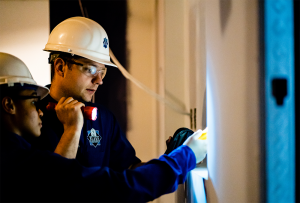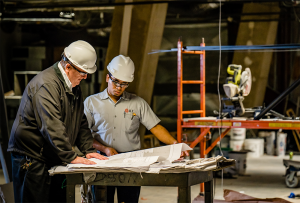Here’s everything you need to know about launching a career in building engineering:
- What are commercial buildings?
- What is a building engineer?
- What is a typical day for a building engineer?
- What is the career path for a building engineer?
- How much does a building engineer make?
- How do I advance my career?
- What training/education does a building engineer need?
- How stable are engineering jobs?
- How is technology changing the building engineer’s job?
- Who’s hiring? Where should I look for job openings in my area?
- What are the skill set levels and training courses required for various level positions within the Building Engineering Field?
Want to see a snapshot into a typical day as a building engineer? Watch as professionals in the field explain the job, and why they chose the field in the first place:
What are commercial buildings?
 Commercial buildings are all around us. Your doctor’s office is probably in a medical office building. That coffee you picked up this morning was likely from a tenant in a retail building.
Commercial buildings are all around us. Your doctor’s office is probably in a medical office building. That coffee you picked up this morning was likely from a tenant in a retail building.
The latest shipment that arrived on your doorstep most likely came to you through a warehouse or distribution center.
Commercial buildings include:
- Office buildings;
- Warehouse and industrial buildings;
- Retail buildings;
- Mixed-use buildings (that combine several different space uses in one location – like office, retail, and apartments).
In some cases, each of these categories can be further sub-divided:
- Office buildings
- Medical office buildings
- Government buildings
- Warehouse and industrial buildings
- Distribution centers
- Warehouses
- Manufacturing facilities
- “Flex” buildings
- Retail buildings
- Malls
- Shopping centers
- Power centers
Commercial buildings cover a wide spectrum – from relatively simple — like a single story industrial building — to extremely complicated — a large office park with multiple buildings sharing the same building systems.
What is a building engineer?
Regardless of the complexity of the building, it takes a team of people to manage and maintain commercial buildings, building engineers play a crucial role on that team. Building engineers maintain and repair the building’s major operating systems, including:
- Heating, ventilation, and air conditioning (HVAC)
- Lighting
- Electrical distribution
- Plumbing
- Life safety systems — including fire alarms and fire sprinkler systems
Building engineers optimize building operations to keep tenants happy, which also ensures that the property operates as efficiently as possible. Not only does efficiency help the tenant to reduce their occupancy costs, but it helps improve the building owner’s financial performance, too.
 To optimize the performance of a commercial building, building engineers must take on the responsibility of maintaining the building systems with the highest level of precision and accuracy.
To optimize the performance of a commercial building, building engineers must take on the responsibility of maintaining the building systems with the highest level of precision and accuracy.
In the event a building system does breaks down, the building engineer will repair it.
Because building engineers also tend to have a great deal of contact with tenants, they also function as the “face” of the building manager. Since building engineers focus on keeping tenants happy and comfortable, one of the most important aspects of their job is a dedication to customer-service.
Sustainability and energy efficiency are also important aspects of the building engineer’s responsibilities. Many buildings in the Washington, DC Metro area are rated under the Leadership in Engineering and Environmental Design (LEED) program as designed by the US Green Building Council. And almost all office buildings in the market use sustainable practices – even if they do not pursue LEED certification. On top of that, the most desirable engineers are those who can optimize the performance of building systems and who can drive down energy costs in the process.
Although he or she might work in a retail or industrial building, the majority of building engineers work in mixed-use or office buildings.
What is a typical day for a building engineer?
It depends! Particularly at properties with a large building engineering staff, the building engineer might have a very specific role — like HVAC, electrical, or plumbing — making each day’s responsibilities fairly predictable.
In most cases, however, the building engineer is a “jack of all trades” — responsible for all operational issues at a property. For these building engineers, there is no “typical” day – and that is one of the biggest draws for many people who gravitate to this career path.
What is the career path for a building engineer?
 While the titles might change from company to company, building engineers tend to be grouped by their skillset. Common titles include:
While the titles might change from company to company, building engineers tend to be grouped by their skillset. Common titles include:
Maintenance Helper (or Day Porter): an entry-level position for a person with very limited engineering skills and experience
Maintenance Technician: an entry-level position for a person with limited engineering skills and experience
Building Engineer: a mid-level position for a person with solid engineering skills and several years of experience
Lead Building Engineer: a mid-level position for a person who wants to supervise other building engineers or for someone with strong engineering skills
Chief Engineer: an upper-level leadership position for a senior building engineer – chief engineers manage the engineering team members, optimize the operation of major building system, manage operational budgets, and “run” a building
Director of Engineering: an upper-level leadership position for experienced chief engineers – senior chief engineers serve as executive leaders, and they often manage the engineering staff for a larger portfolio of buildings
Vice President of Engineering: often the executive leader of a company or a region within a national/international company
How much does a building engineer make?
Most building engineering team members are paid on an hourly basis. While compensation can vary based on experience, title and company, here is the expected average annual salary for the most common building engineering positions:
Maintenance Helper (or Day Porter) — $ 32,230 plus overtime
Maintenance Technician — $ 50,390 plus overtime
Maintenance Supervisor – $68,360 plus overtime
Building Engineer — $74,520 plus overtime
Lead/Chief Building Engineer — $100,170 plus overtime
Director of Engineering – $166,850
Source: 2018 AOBA Wages & Benefits Survey
In addition to base compensation, these positions often include a competitive benefits package:
- Overtime for hourly employees
- Paid Time Off (PTO) — holidays, vacation, sick days
- Annual bonus
- Uniforms and Personal Protective Equipment (PPE)
- Health, prescription, vision, and dental insurance
- Life insurance
- Disability insurance
- Retirement (pension, 401(k), or other retirement vehicle)
- Flexible spending accounts
- Wellness programs
- Employee assistance programs
- Education, training, and development
It is common for at least some members of the building engineering team to be on-call 24/7 to support the needs of their assigned building(s). However, if you end up working additional hours, the overtime you earn can substantially improve your pay.
How do I advance my career?
 A team of qualified professionals works together to ensure the integrity of every commercial building in the Washington, DC area, meaning the key to a successful career in building engineering is the ability to work well with a team. Being able to work as a member of a team — and to be able to step up and lead on a project or activity — is critical to the success of any career.
A team of qualified professionals works together to ensure the integrity of every commercial building in the Washington, DC area, meaning the key to a successful career in building engineering is the ability to work well with a team. Being able to work as a member of a team — and to be able to step up and lead on a project or activity — is critical to the success of any career.
If you follow each of these tips on the way to becoming a building engineering technician, the sky is limit!
You can grow your career — at your own pace — by:
- Working hard
- Committing to lifelong learning and development
- Seeking out new opportunities and challenges
- Working with a mentor who can guide your career path
The building engineer is part of a larger team of professionals who work together to optimize the performance of a commercial building. Being able to work as a member of a team — and, if it is part of your career plan, to lead a team — is critical to your success.
What training/education does a building engineer need?
Although it depends on the company and the requirements of the position, as an entry level employee, you may not need much formal training to get started. Employers are looking for team members who are:
- Self-motivated
- Flexible – able to adapt to constantly-changing conditions
- Mechanically inclined
- Service-oriented and customer-focused
- Life-long learners
- High school graduate or GED recipients
For details about what skills you need for different positions within the industry click here.
Entry-level building engineering team members will focus on learning how building systems operate and will gain the “tool skills” needed to repair and maintain these systems.
You can expect to be promoted to a building engineer position once you have shown proficiency in repairing and maintaining building systems.
Through a combination of on-the-job training and formal education (often paid for by your employer), building engineers will learn about:
- HVAC systems
- Electrical systems
- Plumbing systems
- Energy efficiency strategies
- Customer service
As building engineers advance in the industry, they typically choose to focus on one of two different career tracks — engineering or engineering management.
 The engineering side will focus on repairing and maintaining increasingly complex building systems. With the right education and experience, an engineer can become an exceptional practitioner, and the go-to expert on the nuts and bolts of their building’s operational systems. The engineering management focus will teach lead engineers how to supervise other members of their team; chief engineers will learn how to manage a team of engineering employees; a senior chief engineer or vice president of engineering will be responsible for leading a larger team of engineering professionals throughout their building or complex.
The engineering side will focus on repairing and maintaining increasingly complex building systems. With the right education and experience, an engineer can become an exceptional practitioner, and the go-to expert on the nuts and bolts of their building’s operational systems. The engineering management focus will teach lead engineers how to supervise other members of their team; chief engineers will learn how to manage a team of engineering employees; a senior chief engineer or vice president of engineering will be responsible for leading a larger team of engineering professionals throughout their building or complex.
The AOBA Engineering Talent Task Force created this Competency Guideline to explain the various skill sets that are needed at each progressive level of responsibility in building engineering.
How stable are engineering jobs?
Building engineering positions are incredibly stable careers. Some commercial buildings have been owned by the same entity for decades, and others are bought and sold many times over. However, no matter the ownership, there will always be a need to employ highly skilled building engineers to operate it.
A number of factors are fueling the demand for engineering jobs, including:
- An increased number of commercial buildings in the Washington, DC market;
- Increased sophistication of building systems – requiring a different skill set for building engineers;
- Impending retirements of senior engineering professionals in the next 5-10 years.
How is technology changing the building engineer’s job?
Today’s commercial buildings are highly automated; today’s building engineers are as likely to rely upon their laptop, tablet, and smartphone as they do their hand tools. Building engineers work with the latest technology to optimize the performance of the various operating systems that keep their building running smoothly.
 The building engineer is exposed to a variety of different technologies, both to assist tenants, and monitor and control the various building systems. Tenant management-related technologies include digital communication via email and text message, and apps to help manage tenant service requests and track preventive maintenance tasks.
The building engineer is exposed to a variety of different technologies, both to assist tenants, and monitor and control the various building systems. Tenant management-related technologies include digital communication via email and text message, and apps to help manage tenant service requests and track preventive maintenance tasks.
Building Automation Systems (BAS) — computer systems and apps that monitor and control the various building systems — include:
- HVAC
- Lighting
- Elevators
- Life safety systems
- Access control systems
- CCTV and video surveillance
To excel in this business, the building engineer needs to show proficiency in both tool skills and well as the use of technology.
What are the skill set levels and training courses required for various level positions within the Building Engineering Field?
While job descriptions and titles vary from company to company, the competency guidelines remain consistent through each general level of expertise. The four levels of seniority are: entry-level, mid-level, senior-level, and executive-level. Click here for details.
